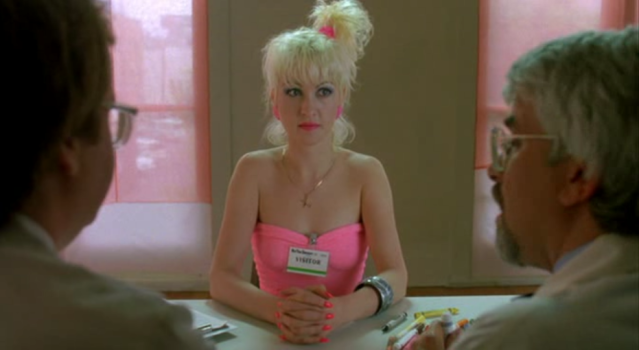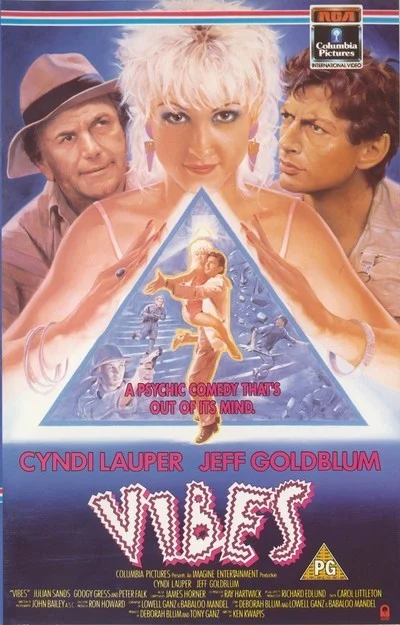Control Nathan Rabin: Vibes (1988)
Welcome to the latest installment of Control Nathan Rabin. It’s the column where I give the 669 exemplars of compassion and human dignity who pledge to this site’s Patreon account an opportunity to choose between which of two impossibly terrible-looking movies I watch and then write about.
It’s also the very first entry in a new column called Star-Breakers, about failed cinematic vehicles for pop stars. It’s inspired by an upcoming article for Rotten Tomatoes I wrote about that subject as well as my enduring fascination with the busily populated intersection of movie and music stardom.
With A Star is Born rocking critics and audiences alike and generating all manner of Oscar talk, I figured it would be good to revisit one of two would-be star-making vehicles for top pop stars of the day that ended up ending movie careers instead. The two choices were 1991’s Cool As Ice, Vanilla Ice’s richly and widely mocked play for big screen immortality, or the ill-fated 1988 science-fiction comedy Vibes, which failed to make Cyndi Lauper a movie star.
Y’all must be obsessed with the early films of TV powerhouse Ken Kwapis, because for the second day in a row I am writing about a movie he directed in the 1980s before he pivoted to television and became a prolific helmer of beloved cult shows like The Larry Sanders Show and The Office.
Yesterday we explored the sad psychic geography of his perversely family-unfriendly Big Bird-in-peril bummer Follow That Bird. Today we’re following it up with a movie Kwapis got onboard once original director Ron Howard presumably read the film’s script and realized that not even a consummate cinematic magician like himself could create something transcendent and enduring out of such garbage.
It’s easy to see how Vibes might look good on paper, particularly before Ron Howard and Dan Ackroyd left the project. In its original incarnation, Vibes would have reunited the team behind Splash (director Ron Howard and screenwriters Babaloo Mandel and Lowell Ganz) for a high-concept, special effects-heavy cross between Ghostbusters and Romancing the Stone starring the man who first dreamed up Ghostbusters and beloved pop star Cyndi Lauper in her motion picture starring debut.
Alas, by the time Vibes lurched into theaters in 1988 it had the exhausted feel of something everyone had given up on long before it passed the finish line. Ackroyd got cold feet about starring opposite a first-time actress and, need I remind you, Ackroyd not only said “Hell yes!” to playing multiple roles in the motion picture Nothing But Trouble, he also made that hideous nightmare world and movie happen in angry defiance of God’s will by writing as well as directing it. Ackroyd also thought it was a swell idea to get duded up like Pulp Fiction’s The Gimp opposite a leather-clad and lusty Rosie O’Donnell in a “comic” adaptation of a non-comic erotic novel written by Anne Rice in a movie directed by renowned master of the sensual arts Garry Marshall called Exit to Eden. Yet even someone with judgment as consistently terrible as Ackroyd realized that Vibes was destined to be a disaster.
Name a more iconic duo!
Instead of Ackroyd, the thankless role of Nick Deezy (it’s like they couldn’t come up with an actual name for the character, so they went with a cartoonish place-holder) went to the wonderful Jeff Goldblum. There’s something inherently otherworldly about Goldblum. He seems like someone tuned into frequencies and energies the rest of us know nothing about. He’s eccentric and otherworldly, a wild-eyed, charismatic lunatic even when he’s not playing someone with psychic powers, a seer with a powerful connection to the spirit world he can harness just by touching things.
Goldblum is not like you and me. He’s weirder, bigger, better, crazier, sexier. He’s enjoying a nice cultural moment now not just as an actor but also as a sort of left-hand sex bomb and enduring cultural icon, a geek God. There’s a distinct logic to casting a world-class space cadet like Goldblum as a man who is not like everybody else. It’s too bad the movie plays against Goldblum’s extraordinary strengths as an actor and movie star by giving him terrible sitcom dialogue and making his romantic lead an uptight, slut-shaming jerk with an unfortunate habit of lashing out petulantly against his female lead whenever she begins to warm up to him, despite his prickliness, and unfortunate preponderance of hairstyle-themed insults.
It doe not help that in the film’s early scenes Goldblum—who is nearly as tall and ingratiatingly bird-like as the hero of Kwapis’ previous film, Big Bird—looks like he’s shopping off the rack at David Byrne’s Comically Over-Sized Suit Emporium for the Tall and Distressingly Skinny. When he’s in an Ecuador devoid of brown people, however, he dresses like a normcore Indiana Jones, an Indy who travels the world having adventures, sure, but also moonlights as a middle manager at Blockbuster.
Nick is a psychometrist. That’s a fancy word for a form of ESP that allows someone to make powerful associations and connections with something by making physical contact. As the film begins, this gift is being wholly abused by everyone around Nick, albeit in some perversely petty ways. Nobody’s asking for lottery numbers but a security guard does ask Nick to use his incredible, superhuman powers of perception to touch his lunch and ascertain, conclusively, whether the fish of the day was indeed fresh or had gone bad. No wonder Nick is annoyed wit humanity and his alternately stupid and amazing gift.
Even more annoyingly, Nick discovers that his girlfriend has been “playing bouncey bouncey with another guy.” That wouldn’t be so bad if they were just playing bouncey bouncey and not also having sex but it turns out that “bouncey bouncey” is a slang term for having sex.
Nick’s suspicions are confirmed when he holds his soon-to-be-ex’s undergarments and whines, “Another man has been holding these panties. You know I can tell!” In Vibes, being a psychometrist means whatever the screenplay needs it to mean at any given moment.
That’s similarly true of the psychic gifts of Nick’s love interest, Sylvia Pickel (Cyndi Lauper), an adorable pixie with a long, unfortunate romantic history with the wrong men (most recently a gambling addict played by a young Steve Buscemi) who fell off a ladder when she was twelve years old. She was in a coma for two weeks and when she awoke she had acquired a friend and mentor from the other side named Louise who helped her attain uncanny powers, including the ability to astral project.
Sylvia has remarkable, preternatural gifts yet she spends way too much of the movie throwing herself unsuccessfully at men, the richer the better. As a preeminent pop star of the mid-1980s, Lauper was the quirky friend to Madonna’s chameleon-like sex bomb but Vibes decides to over-sexualize Lauper and her character, sticking her in an endless series of tight, short skirts and even tighter, lower-cut tops, then hurtling her in the direction of any reasonably attractive nearby man.
Nick makes snide comments about the provocative nature of Sylvia’s barely there get-ups in a way that’s supposed to be fun and flirtatious but that instead feels condescending and mean, superior and judgmental.
Yes, Nick and Sylvia have incredible psychic powers. They have incredible Extrasensory Perception, or ESP, but they do not have a goddamn lick of sense between them. So when what is obviously a con man and grifter named Harry Buscafusco (Peter Falk) offers to pay them handsomely to help him find his lost son in Ecuador, they acquiesce.
As is often the case, Falk’s vibe here is “Incorrigible liar and con man out to bamboozle and manipulate the suckers around him for a fat-ass payday” so these unusually gifted dumb dumbs head down to Ecuador and discover, to their surprise if not ours, that the shifty-eyed treasure-seeker yanking them around for his own selfish ends is not what he seems.
Harry plays to our heroes’ casual racism in convincing them to try to save his non-existent son, warning them about “Cave-Dwellers shrinking his head. And his head wasn’t that big to start with!”
Thankfully Vibes does not follow in the footsteps of Indiana Jones and the Temple of Doom in depicting a foreign culture as a racist, xenophobic nightmare of ghoulish horrors. Instead Vibes opts for the less racist but still pretty racist tactic of making a movie set primarily in Ecuador in which pretty much all the characters are white and English-speaking.
The movie’s conception of diversity involves including in the cast not just white Americans but also white Europeans, most notably Julian Sands as a man on a desperate quest for a City of Gold presumably located not far from Indiana Jones’ Lost Ark, Temple of Doom and Crystal Skull.
Vibes wants desperately to be Ghostbusters in Ecuador but the screenplay is pure television, full of canned one-liners aching desperately for the faked validation and approval of a roaring, easily impressed laugh track.
Vibes has a lot of problems but Lauper, perhaps surprisingly, is not one of them. She has an enormously appealing, New Wave Betty Boop quality and a nice, light comic touch that gets the most out of lines like, “You don’t ask a guy named Icepick too many questions.”
In the few moments when Lauper and Goldblum are allowed to like each other they have a fun, quirky chemistry but the dreadful screenplay undermines them by making Goldblum’s character an uptight asshole and Lauper the kind of man-crazed gold-digger who illustrates to an unimpressed Nick that the easiest way to ascertain whether there are any wealthy potential sugar daddies within earshot is by very loudly asking diners at an upscale eatery questions about the care and maintenance of Rolls Royces.
The filmmakers didn’t exactly make things easy for Lauper by making her a double act with an invisible sidekick she spends much of the film having very one-sided conversations with, but Lauper is up to the challenge. Ackroyd might have opted out of Vibes out of understandable concerns that Lauper wouldn’t be able to hold her own but in the end she did just fine. She did more than fine. She was charming and funny and likable in an impossible role in a desperately awful, unfunny film.
Lauper did not fail Vibes. Instead, Vibes failed her. I don’t blame her for not wanting to subject herself to this manner of indignity again.
Participate in fun, Ken Kwapis-centered polls and support independent media over at https://www.patreon.com/nathanrabinshappyplace








